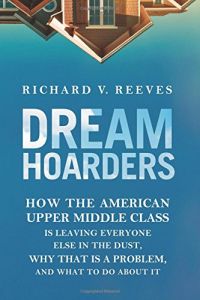
Dream Hoarders
How the American Upper Middle Class Is Leaving Everyone Else in the Dust, Why That Is a Problem, and What to Do About It
Recommendation
Most discussions about increasing economic inequality in the United States focus on the disparity between the top one percent and the rest of the population. But as Brookings Institution fellow Richard V. Reeves points out, the upper middle class is separating from the rest of society at an alarming rate. The upper middle class, which makes up the top economic quintile along with the very wealthy, now holds more than 50% of the nation’s wealth. What’s worse, the top 20% has constructed a highly effective “glass floor” that protects its members from a precipitous fall into the middle class or lower. Reeves shows how the upper middle class wields such tools as exclusionary zoning laws, legacy preferences in college admissions and unpaid internships to shield itself against competition from below. As a member of the upper middle class himself, Reeves is able to reveal these unfair practices without sounding like an anticapitalist ideologue. And he enlivens this relatively dour subject with generous doses of dry wit. This study will benefit policy makers, education reformers, social reformers and labor advocates, and it may spark some soul-searching among the more fortunate.
Summary
About the Author
Senior fellow at the Brookings Institution Richard V. Reeves co-directs Brookings’s Center on Children and Families.








Comment on this summary
Some of us are simply born into these -extremely important- conditions.
Further, "out of wedlock" marriages happen in all income families; Elon Musk f.ex. had 7 of his 13 (the exact number is uncertain) sons out of wedlock, is at the time of this post in a legal battle with a woman that he hasn't married, for the custody of his 13th (or 14) , but this hasn't hurt him financially.
The upper middle class and of course the billionaire class, have access to abortion or, in the case of some, enough money for an army of in or "out of wedlocks" so that an unplanned birth will not mean financial ruin (though arguably the Billionaire class cannot be in financial precarity regardless of their decisions).
Though I understand that the argument of "traditional family structure and values" (not those of the example above) offers a convenient rationalisation to this growing, evident, social issue - increasing inequalities- , it takes a certain amount of effort to ignore the advantages inherited wealth brings for any family.
Finally, I believe that both authors would identify "community dysfunction" as another reason for this issue. What I am not so certain about, is their definition of community. Does the idea of community encompasses all Americans for Mr. Murray?
if so, there are are more than a few things to be done by the community, to help out the less fortunate of its members. If not.. there's a word for that.